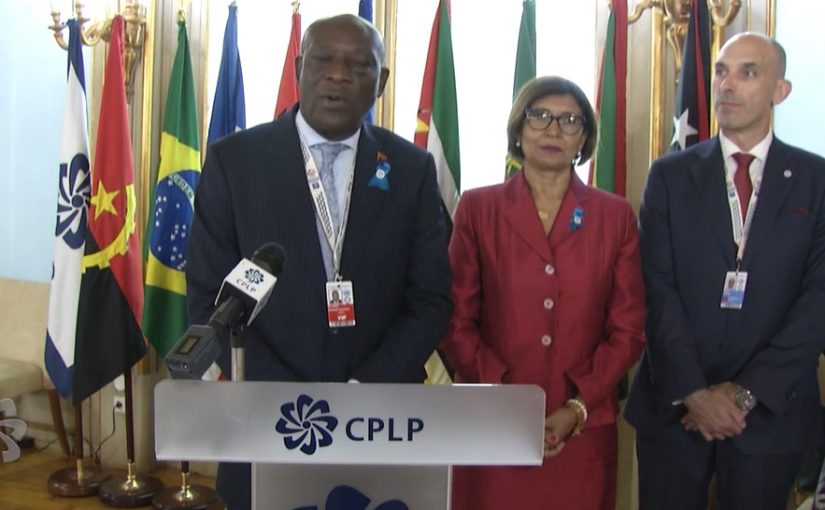State to inject US$500M in Mozambique Development Bank, PRECE says
CPLP: Maritime affairs ministers create platform to fight illegal fishing

Picture: CPLP
Maritime affairs ministers from Portuguese-Language countries have formalised the creation of a cooperation platform to promote sustainable fishing and combat illegal, unreported and unregulated fishing, which accounts for 35% of world catches.
The instrument that creates the cooperation platform for the promotion of sustainable fishing and the prevention, combating and elimination of illegal, unreported and unregulated fishing was signed during an extraordinary meeting of ministers of maritime affairs from member states of the Community of Portuguese Language Countries (CPLP), held on Wednesday at the organisation’s headquarters in Lisbon.
“Illegal, unreported and unregulated [IUU] fishing remains one of the greatest threats to marine ecosystems, due to its potent ability to undermine national regional efforts to manage fishing sustainably, as well as efforts to conserve marine biodiversity,” said Angola’s maritime affairs minister, the country currently presiding over the CPLP, at the opening of the meeting.
According to António Francisco de Assis, IUU fishing covers all types and sizes of fisheries, both on the high seas and areas of national jurisdiction and may be associated with organised crime.
“Fishing resources available to good faith fishermen are removed” by IUU fishing, which can lead to the collapse of local fisheries and the products of this illegal activity can reach different markets through foreign trade, thus strangling the local food supply, which “threatens livelihoods, raises poverty rates and contributes to food and nutritional insecurity” in CPLP countries, the Angolan minister said.
Present at the ceremony, the deputy director of the Food and Agriculture Organisation (FAO), Maria Helena Semedo said that currently “around 35 percent of the world’s catches come from illegal fishing.
“Look at what this can represent in terms of wealth and in terms of a contribution to food security,” she stressed.
According to Semedo, the Portuguese-speaking countries, despite representing 3.7% of the world population, have about 6.5% of the exclusive economic area, which is almost double.
“This shows the importance of the oceans or the sea for the CPLP,” she pointed out, arguing that the instrument created “will allow for a more sustainable management of these resources, will allow for more effective management, will allow for the exchange of information and will also help in the implementation of the latest World Trade Organization decision.”
The organisation approved, on June 17, in Geneva, an agreement that provides a global framework that limits subsidies to IUU fishing, estimated at $22 billion (21 billion euros) and considered the biggest factor in the reduction of global fish populations.
Recalling that fish consumption has increased from six kilos ‘per capita’ per year in 1960 to 20 kilos now, the FAO official underlined the importance of fisheries for food security, but also the economic and social role that fisheries represent.
On the agreement signed, Semedo said it was a “great advance by the CPLP”, which “will bring more growth” to member states and argued that it was now necessary to move on to its implementation, expressing FAO’s willingness to continue to collaborate with the Portuguese-speaking organisation.
The executive secretary of the CPLP, Zacarias da Costa, described the agreement as “good news” for the CPLP and noted that the fact the agreement had been reached in just eight months “demonstrates the interest that the issue has raised in the member states of the organisation.
Also on Wednesday, the CPLP, FAO and the Pew Charitable Trusts (PEW) organised a conference on “solutions and partnerships to promote sustainable fisheries and strengthen the implementation of international instruments to prevent, deter and eliminate IUU fishing,” as a side event of the United Nations Ocean Conference.
Speaking on Tuesday at the Conference being held in Lisbon, the World Trade Organization director-general called on governments to formalize adherence to the agreement to eliminate subsidies for IUU fishing, approved this month, calling it “a major step forward in protecting the oceans.”
“The new agreement on fisheries subsidies, finally concluded after 21 years [of negotiations] is a huge step forward in protecting the oceans,” said Ngozi Okonjo-Iweala, who was speaking in a debate at the UN Ocean Conference in Lisbon.












Leave a Reply
Be the First to Comment!
You must be logged in to post a comment.
You must be logged in to post a comment.